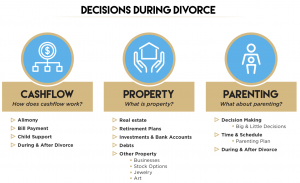Is Connecticut a Divorce Community Property State?

One of the misconceptions we hear is that Connecticut is a “community property” state for divorce. It is not. Like most states, Connecticut is an “equitable distribution” or “equitable division” state.
What is Community Property?
Generally speaking, in community property states, the spouses equally own all money earned by either one of them from the beginning of the marriage until their date of separation. All property acquired during the marriage with “community” money is owned equally by both spouses, regardless of who purchased it.
The keyword when you think of community property is equal.
What is Equitable Distribution?
Family courts in equitable distribution states like Connecticut divide marital property according to what is fair, or equitable, for both parties during a divorce. This isn’t the same as equal distribution. Equitable does not necessarily mean 50/50. The focus of equitable distribution the needs of each party and the facts of the case. What constitutes an equitable distribution of property is determined in each individual case as negotiated by the parties and the lawyers or decided by the judge.
The keyword when you think of equitable distribution is equitable.
Read: How Does Property Division Work in Connecticut?
How Does Equitable Distribution Work in Connecticut?
Equitable distribution in Connecticut’s is quite different from other states that follow the equitable distribution rule of property division. This is because, in addition to being an equitable distribution state, Connecticut is an “all property state.”
In a Connecticut divorce, family law courts have broad authority to award marital property to either spouse, regardless of:
- how it is titled
- when it was acquired
- or whether it was received as a gift or inheritance.
In Connecticut, all property is marital property, which is a sharp contrast to the law in most equitable distribution states. In theory, this means that everything owned by both spouses (and all debts owned by both spouses) is “fair game” or subject to division in a Connecticut divorce. This is what makes Connecticut an “all property” state, which means that everything the couple owns or owes is fair game when it comes to dividing things up in divorce.
Read: What is Equitable Distribution?
The Comprehensive Connecticut Property Division Guide
How to divide property is one of the most important issues in divorces. And, it’s one of the most confusing. There are no set formulas or rules on how property will be divided. The good news is that creates tremendous flexibility for experienced divorce attorneys to craft an individualized approach. In order to prepare to make solid and informed decisions, you need to understand how property division works. Our Comprehensive Connecticut Property Division Guide tells you everything you need to know about property division in Connecticut. Read: Property Division: The Comprehensive Connecticut Guide
Next Steps
Now that you have learned that Connecticut is not a community property state and about how equitable distribution works in Connecticut, you may want to learn more about how property is divided in Connecticut divorces. If so, head here.
As you can tell, equitable division isn’t simple in Connecticut — which means there is a lot of opportunity for creative negotiations, strategy, and solutions. It’s important to have an experienced divorced legal team be your guide.
Our first step at Freed Marcroft, the Goals & Planning Conference, is designed to get to the heart of your problem and unveil your true goals. Then, we take those goals along with the facts of your case and analyze them so that we can present you with recommendations and options on how to move forward.








